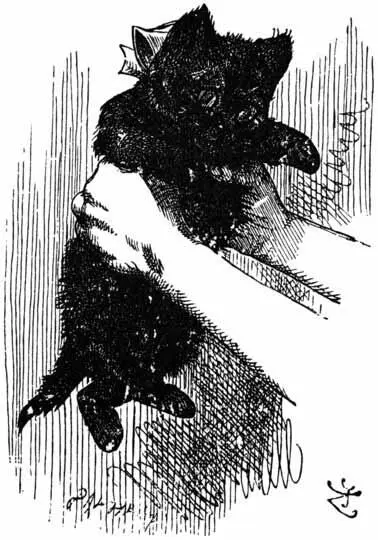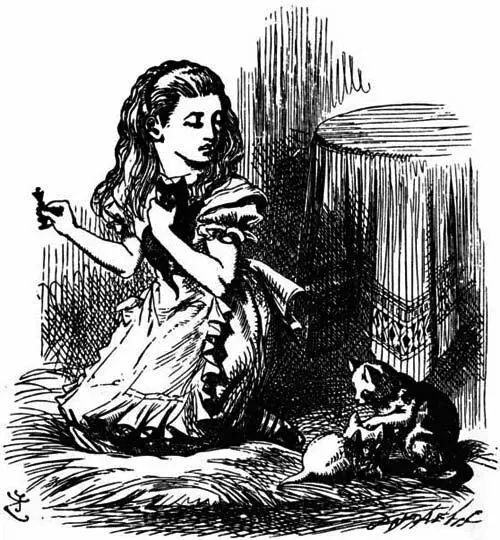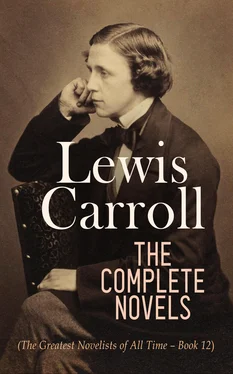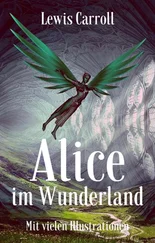
Chapter 12
Which Dreamed It?
Table of Contents
‘Y our majesty shouldn’t purr so loud,’ Alice said, rubbing her eyes, and addressing the kitten, respectfully, yet with some severity. ‘You woke me out of oh! such a nice dream! And you’ve been along with me, Kitty—all through the Looking-Glass world. Did you know it, dear?’
It is a very inconvenient habit of kittens (Alice had once made the remark) that, whatever you say to them, they always purr. ‘If they would only purr for “yes” and mew for “no,” or any rule of that sort,’ she had said, ‘so that one could keep up a conversation! But how can you talk with a person if they always say the same thing?’
On this occasion the kitten only purred: and it was impossible to guess whether it meant ‘yes’ or ‘no.’
[•] So Alice hunted among the chessmen on the table till she had found the Red Queen: then she went down on her knees on the hearth-rug, and put the kitten and the Queen to look at each other. ‘Now, Kitty!’ she cried, clapping her hands triumphantly. ‘Confess that was what you turned into!’

(‘But it wouldn’t look at it,’ she said, when she was explaining the thing afterwards to her sister: ‘it turned away its head, and pretended not to see it: but it looked a little ashamed of itself, so I think it must have been the Red Queen.’) ‘Sit up a little more stiffly, dear!’ Alice cried with a merry laugh. ‘And curtsey while you’re thinking what to—what to purr. It saves time, remember!’ And she caught it up and gave it one little kiss, ‘just in honour of having been a Red Queen.’
‘Snowdrop, my pet!’ she went on, looking over her shoulder at the White Kitten, which was still patiently undergoing its toilet, ‘when will Dinah have finished with your White Majesty, I wonder? That must be the reason you were so untidy in my dream—Dinah! do you know that you’re scrubbing a White Queen? Really, it’s most disrespectful of you!
‘And what did Dinah turn to, I wonder?’ she prattled on, as she settled comfortably down, with one elbow in the rug, and her chin in her hand, to watch the kittens. ‘Tell me, Dinah, did you turn to Humpty Dumpty? I think you did—however, you’d better not mention it to your friends just yet, for I’m not sure.
‘By the way, Kitty, if only you’d been really with me in my dream, there was one thing you would have enjoyed—I had such a quantity of poetry said to me, all about fishes! To-morrow morning you shall have a real treat. All the time you’re eating your breakfast, I’ll repeat “The Walrus and the Carpenter” to you; and then you can make believe it’s oysters, dear!
‘Now, Kitty, let’s consider who it was that dreamed it all. This is a serious question, my dear, and you should not go on licking your paw like that—as if Dinah hadn’t washed you this morning! You see, Kitty, it must have been either me or the Red King. He was part of my dream, of course—but then I was part of his dream, too! Was it the Red King, Kitty? You were his wife, my dear, so you ought to know—Oh, Kitty, do help to settle it! I’m sure your paw can wait!’ But the provoking kitten only began on the other paw, and pretended it hadn’t heard the question.
Which do you think it was?
A boat beneath a sunny sky,
Lingering onward dreamily
In an evening of July—
Children three that nestle near,
Eager eye and willing ear,
Pleased a simple tale to hear—
Long has paled that sunny sky:
Echoes fade and memories die.
Autumn frosts have slain July.
Still she haunts me, phantomwise,
Alice moving under skies
Never seen by waking eyes.
Children yet, the tale to hear,
Eager eye and willing ear,
Lovingly shall nestle near.
In a Wonderland they lie,
Dreaming as the days go by,
Dreaming as the summers die:
Ever drifting down the stream—
Lingering in the golden gleam—
Life, what is it but a dream?
The End
Table of Contents
Preface
Chapter 1
Chapter 2
Chapter 3
Chapter 4
Chapter 5
Chapter 6
Chapter 7
Chapter 8
Chapter 9
Chapter 10
Chapter 11
Chapter 12
Chapter 13
Chapter 14
Chapter 15
Chapter 16
Chapter 17
Chapter 18
Chapter 19
Chapter 20
Chapter 21
Chapter 22
Chapter 23
Chapter 24
Chapter 25
Is all our Life, then, but a dream
Seen faintly in the golden gleam
Athwart Time’s dark resistless stream?
Bowed to the earth with bitter woe,
Or laughing at some raree-show,
We flutter idly to and fro.
Man’s little Day in haste we spend,
And, from its merry noontide, send
No glance to meet the silent end.
Table of Contents
O ne little picture in this book, the Magic Locket was drawn by ‘Miss Alice Havers.’ I did not state this on the title-page, since it seemed only due, to the artist of all these (to my mind) wonderful pictures, that his name should stand there alone.
The descriptions, here and here, of Sunday as spent by children of the last generation, are quoted verbatim from a speech made to me by a child-friend and a letter written to me by a lady-friend.
The Chapters, headed ‘Fairy-Sylvie’ and ‘Bruno’s Revenge,’ are a reprint, with a few alterations, of a little fairy-tale which I wrote in the year 1867, at the request of the late Mrs. Gatty, for ‘Aunt Judy’s Magazine,’ which she was then editing.
It was in 1874, I believe, that the idea first occurred to me of making it the nucleus of a longer story. As the years went on, I jotted down, at odd moments, all sorts of odd ideas, and fragments of dialogue, that occurred to me—who knows how?—with a transitory suddenness that left me no choice but either to record them then and there, or to abandon them to oblivion. Sometimes one could trace to their source these random flashes of thought—as being suggested by the book one was reading, or struck out from the ‘flint’ of one’s own mind by the ‘steel’ of a friend’s chance remark—but they had also a way of their own, of occurring, à propos of nothing—specimens of that hopelessly illogical phenomenon, ‘an effect without a cause.’ Such, for example, was the last line of ‘The Hunting of the Snark,’ which came into my head (as I have already related in ‘The Theatre’ for April, 1887) quite suddenly, during a solitary walk; and such, again, have been passages which occurred in dreams , and which I cannot trace to any antecedent cause whatever. There are at least two instances of such dream-suggestions in this book—one, my Lady’s remark, ‘it often runs in families, just as a love for pastry does’; the other, Eric Lindon’s badinage about having been in domestic service.
And thus it came to pass that I found myself at last in possession of a huge unwieldy mass of litterature—if the reader will kindly excuse the spelling—which only needed stringing together, upon the thread of a consecutive story, to constitute the book I hoped to write. Only! The task, at first, seemed absolutely hopeless, and gave me a far clearer idea, than I ever had before, of the meaning of the word ‘chaos’: and I think it must have been ten years, or more, before I had succeeded in classifying these odds-and-ends sufficiently to see what sort of a story they indicated: for the story had to grow out of the incidents, not the incidents out of the story. [ to 2nd preface ]
Читать дальше














